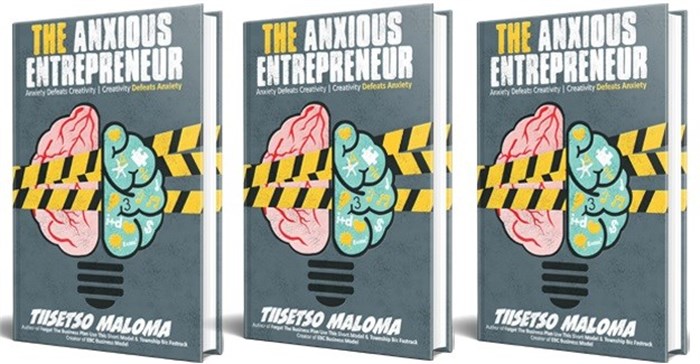
While it has its advantages, entrepreneurship can be highly stressful. In fact, it’s one of the toughest careers in the world, says Tiisetso Maloma. It’s unpredictable and fraught with plans falling through, which is all the worse when you’re not employed by an anonymous corporate but fending for yourself in the business wilds. That’s why Maloma says entrepreneurs are more prone to mental pains and lifetime prevalence of depression than the general population.
But it’s not all bad news. In his fourth and latest book, The Anxious Entrepreneur, Maloma shares his personal experiences with anxiety and how entrepreneurs can actively defuse career anxieties and rather harness that anxiety and stress to enhance their creativity, while also touching on the all-important need for marketing and branding as an entrepreneur.
On his personal ‘wild’ entrepreneurship journey, Maloma has founded businesses like Bula Buka and Startup Picnic and others across the clothing, publishing and IT industries, with lots of failure along the way. It all started after university 10 years ago when he sold graphic design services at a company registered as At Large Communications. He didn’t do the design himself, instead he would hire an actual graphic designer for a client. Over time he taught himself graphic and web design, and while he admits he wasn’t the best, he could make, “good enough logos and Wordpress websites,” with several entities still carrying the logos he designed for them.
Later on he hustled to distribute a new local brand at the time called I am Kool Kid, with a relative, Mohlomi Matlala. Founded by Antonio Skele, they sold from the boot and also got it into few shops as they were “marketing the heck” out of the in-your-face t-shirts. “By merely walking around wearing the t-shirts, we would get sales. We therefore made sure we were seen at most college events,” Maloma explains, adding that they made it popular in Pretoria, especially around Hatfield; and also in Newtown and Auckland Park in Johannesburg.
In 2010, he founded clothing label Gabble Heights with friend Lesiba Lekgau, which was themed along the lines of high-end brands like Diesel. He also formed street brand Rural Joss Clothing with Promise Sepudumo and Ntshirile Bapela, at a time when he held accounting freelance jobs and other odd jobs to finance many of these entrepreneurial projects and others.
Then, the time came for him to leave all his other jobs to concentrate on the clothing lines, which didn’t pick up financially. “I was devastated. I was broke. I had to move home. I was depressed. I closed them down, and that is when the idea to write my first book Forget the Business Plan Use this Short Model came.”
From there, he also wrote Township Biz Shorttrack and Tales of an African Entrepreneur. Focusing on his latest book, Maloma tapped into his personal experience with the anxiety brought about by not achieving goals, which often leaves you unable to be creative in solving problems and steering progress. That’s a problem because: “Creativity isn’t only for the arty. Creativity means you are being productive, which means you know what to do at that point and you are doing it. Creativity equals productivity.”

As a result, all the stories and chapters in his latest book connect to unzoning from anxiety, then into creativity and productivity with tips like how to set up your day so that it is robust against anxieties that are brought about by a day’s ever-changing mood.
As Maloma believes creativity is sanity, he says, “You need to fuel and inspire it. Take a walk. Read a book. Rest. Exercise. Be curious and inquisitive. Hang out with healthy and inspiring people.” That’s because creativity is how you solve problems, create things and form ways for propelling progress. We do this by withdrawing from our experience bank, so it’s good to keep depositing into your personal experience bank by doing the above-mentioned things to ensure you’re enriched with many probable ideas to solve problems and create things.
If you feel stuck, Maloma says this is normal – you need to rest and or partake in hobbies as that’s when your mind settles and the information you’ve collected over time starts connecting and different ways of steering progress emerge.
If you’re thinking of taking the plunge – giving up your current full-time work to test the wings of an entrepreneurial idea, Maloma says to test in small portions, likening the concept to an analogy of finding a life partner in the cheapest way:
Say you're looking for a partner and you're interested in three people. To get to know them better and choose the one you like most, you'd plan to take all of them out; of course on separate dates. Let’s say a dinner date costs R500. A date with all three would thus cost a total of R1,500 and you'd go on a second date with the one you like most at another R500. This way sums up to R2,000.
Maloma’s alternative is to first take the three candidates out for coffee, say at a cost of R150 each. This adds up to just R450, instead of the R1,500 of the original scenario – a saving of R1,050. Then you'd only take your favourite of the three on a dinner date at a cost of R500. The sum is now R950 instead of R2000, so you'd save R1050 in total.
“This is how it goes in business,” says Maloma: You take it out for coffee before a date, meaning you test a business venture with minimum capital outlay so that if it goes sour, you haven’t lost a huge amount on the dream.
All four books use similar scenarios to depict Maloma’s own pain points as an entrepreneur. “They are like my own manifesto of how I will be doing things going forward – in hindsight,” he says. That’s sound business sense for any entrepreneur. Click here for your copy of The Anxious Entrepreneur and follow him on Twitter to learn from Maloma’s experiences.
